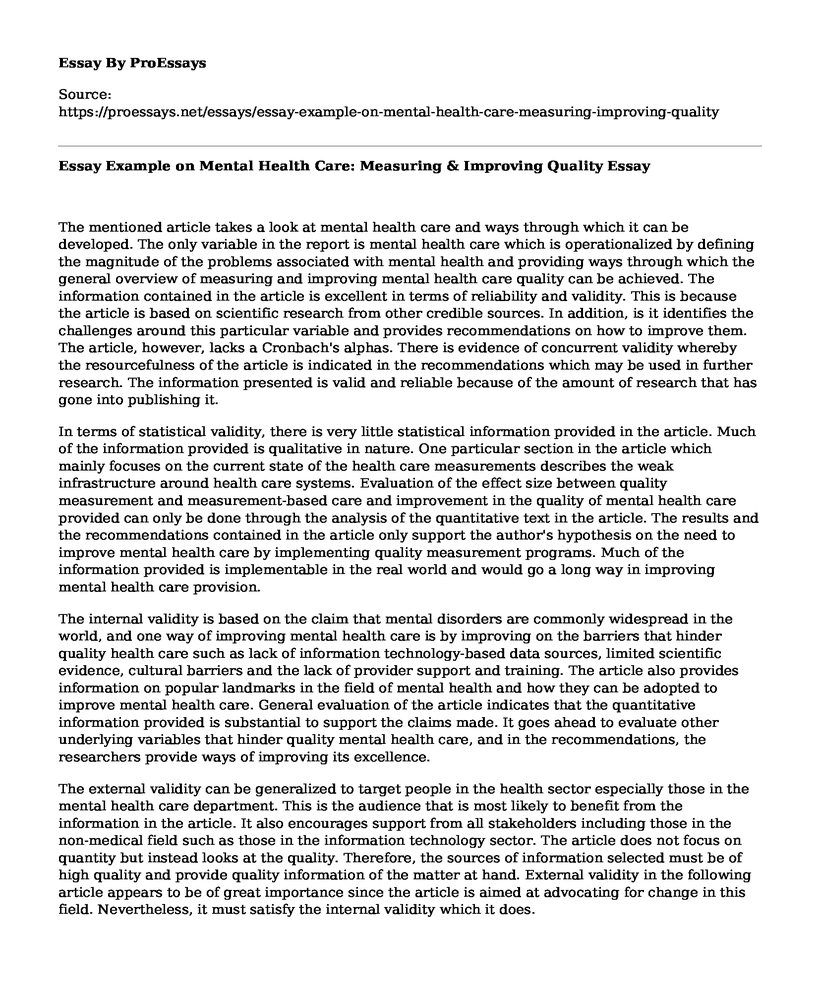The mentioned article takes a look at mental health care and ways through which it can be developed. The only variable in the report is mental health care which is operationalized by defining the magnitude of the problems associated with mental health and providing ways through which the general overview of measuring and improving mental health care quality can be achieved. The information contained in the article is excellent in terms of reliability and validity. This is because the article is based on scientific research from other credible sources. In addition, is it identifies the challenges around this particular variable and provides recommendations on how to improve them. The article, however, lacks a Cronbach's alphas. There is evidence of concurrent validity whereby the resourcefulness of the article is indicated in the recommendations which may be used in further research. The information presented is valid and reliable because of the amount of research that has gone into publishing it.
In terms of statistical validity, there is very little statistical information provided in the article. Much of the information provided is qualitative in nature. One particular section in the article which mainly focuses on the current state of the health care measurements describes the weak infrastructure around health care systems. Evaluation of the effect size between quality measurement and measurement-based care and improvement in the quality of mental health care provided can only be done through the analysis of the quantitative text in the article. The results and the recommendations contained in the article only support the author's hypothesis on the need to improve mental health care by implementing quality measurement programs. Much of the information provided is implementable in the real world and would go a long way in improving mental health care provision.
The internal validity is based on the claim that mental disorders are commonly widespread in the world, and one way of improving mental health care is by improving on the barriers that hinder quality health care such as lack of information technology-based data sources, limited scientific evidence, cultural barriers and the lack of provider support and training. The article also provides information on popular landmarks in the field of mental health and how they can be adopted to improve mental health care. General evaluation of the article indicates that the quantitative information provided is substantial to support the claims made. It goes ahead to evaluate other underlying variables that hinder quality mental health care, and in the recommendations, the researchers provide ways of improving its excellence.
The external validity can be generalized to target people in the health sector especially those in the mental health care department. This is the audience that is most likely to benefit from the information in the article. It also encourages support from all stakeholders including those in the non-medical field such as those in the information technology sector. The article does not focus on quantity but instead looks at the quality. Therefore, the sources of information selected must be of high quality and provide quality information of the matter at hand. External validity in the following article appears to be of great importance since the article is aimed at advocating for change in this field. Nevertheless, it must satisfy the internal validity which it does.
References
Cha, E., Akazawa, M. K., Kim, K. H., Dawkins, C. R., Lerner, H. M., Umpierrez, G., & Dunbar, S. B. (2015). Lifestyle habits and obesity progression in overweight and obese American young adults: Lessons for promoting cardiometabolic health. Nursing & health sciences, 17(4), 467-475. doi:10.1111/nhs.12218
Kilbourne, A. M., Beck, K., Spaeth-Rublee, B., Ramanuj, P., O'Brien, R. W., Tomoyasu, N., & Pincus, H. A. (2018). Measuring and improving the quality of mental health care: a global perspective. World psychiatry : official journal of the World Psychiatric Association (WPA), 17(1), 30-38. doi:10.1002/wps.20482
Cite this page
Essay Example on Mental Health Care: Measuring & Improving Quality. (2022, Dec 27). Retrieved from https://proessays.net/essays/essay-example-on-mental-health-care-measuring-improving-quality
If you are the original author of this essay and no longer wish to have it published on the ProEssays website, please click below to request its removal:
- Case Study With Multicultural Child: The Relational Theory and Existential Therapy
- Description of Attention Deficit Hyperactivity Disorder Paper Example
- Essay Example on Four Elements of Human Emotions Discovered by Kelly
- Essay Example on Empathy: An Intrinsic Feeling that Needs to be Enhanced
- Essay on Connecting Paradigms: Trauma-Free Living Through Motivational Interviewing
- Explaining Human Error Reasoning for Mental Health Treatment - Essay Sample
- Free Paper Sample: Behaviour Problems of Dogs and Cats







